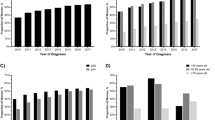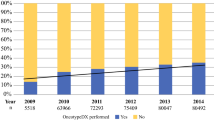Abstract
Background
Use of the Oncotype DX recurrence score (RS) has been widely adopted in women with early-stage hormone receptor-positive (HR+), human epidermal growth factor receptor 2-negative (HER−) breast cancer (BC). Validation studies on the use of RS in male BC (MBC) are lacking.
Objective
The aim of this study was to identify the utilization of RS and association with chemotherapy recommendations in early-stage MBC compared with female BC (FBC).
Methods
Using the National Cancer Database (NCDB), a retrospective review was performed for patients with T1/T2, node-negative, HR+/HER2− BC between 2010 and 2014. Patients were stratified by demographics, tumor characteristics, RS, and chemotherapy use comparing MBC with FBC over the allotted time period.
Results
A total of 358,497 patients—3068 (0.8%) males and 355,429 (99.1%) females—met the inclusion criteria. A smaller proportion of MBC patients received RS testing compared with FBC patients (32% vs. 35%, p < 0.001). Male patients who had RS were younger, had T2 tumors, lymphovascular invasion, and private insurance. The distribution of RS was similar in both groups. Only 4% of MBC patients with low RS received adjuvant chemotherapy, compared with 4.9% of FBC patients. Overall chemotherapy rates were similar in MBC and FBC patients.
Conclusions
Our results showed that RS has not been completely embraced in the management of MBC, although when performed in MBC, chemotherapy recommendations vary based on RS. Whether the use of RS affects the clinical outcomes of MBC is unknown. A prospective registry would help clarify and evaluate the impact of RS on clinical outcomes in MBC.

Similar content being viewed by others
References
Key Statistics for Breast Cancer in Men. https://www.cancer.org/cancer/breast-cancer-in-men/about/key-statistics.html. Accessed 21 Oct 2019.
Gradishar WJ, Abraham J, Aft R, et al. NCCN breast cancer guidelines version 3.2019. 2019. https://www.nccn.org/professionals/physician_gls/pdf/breast.pdf. Accessed 21 Oct 2019.
Muir D, Kanthan R, Kanthan SC. Male versus female breast cancers: a population-based comparative immunohistochemical analysis. Arch Pathol Lab Med. 2003;127(1):36–41. https://doi.org/10.1043/0003-9985(2003)127%3c36:mvfb%3e2.0.co;2.
Shaaban AM, Ball GR, Brannan RA, et al. A comparative biomarker study of 514 matched cases of male and female breast cancer reveals gender-specific biological differences. Breast Cancer Res Treat. 2012;133(3):949–58. https://doi.org/10.1007/s10549-011-1856-9.
Fentiman IS. The biology of male breast cancer. Breast. 2018;38:132–5. https://doi.org/10.1016/j.breast.2018.01.001.
Paik S, Shak S, Tang G, et al. A multigene assay to predict recurrence of tamoxifen-treated, node-negative breast cancer. N Engl J Med. 2004;351(27):2817–26. https://doi.org/10.1056/nejmoa041588.
Paik S, Tang G, Shak S, et al. Gene expression and benefit of chemotherapy in women with node-negative, estrogen receptor-positive breast cancer. J Clin Oncol. 2006;24(23):3726–34. https://doi.org/10.1200/jco.2005.04.7985.
Albain KS, Barlow WE, Shak S, et al. Prognostic and predictive value of the 21-gene recurrence score assay in postmenopausal women with node-positive, oestrogen-receptor-positive breast cancer on chemotherapy: a retrospective analysis of a randomised trial. Lancet Oncol. 2010;11(1):55–65. https://doi.org/10.1016/s1470-2045(09)70314-6.
Sparano JA, Gray RJ, Makower DF, et al. Adjuvant chemotherapy guided by a 21-gene expression assay in breast cancer. N Engl J Med. 2018;379(2):111–21. https://doi.org/10.1056/nejmoa1804710.
Boffa DJ, Rosen JE, Mallin K, et al. Using the national cancer database for outcomes research: a review. JAMA Oncol. 2017;3(12):1722–8. https://doi.org/10.1001/jamaoncol.2016.6905.
Goss PE, Reid C, Pintilie M, Lim R, Miller N. Male breast carcinoma: a review of 229 patients who presented to the Princess Margaret Hospital during 40 years: 1955-1996. Cancer. 1999;85(3):629–39. https://doi.org/10.1002/(sici)1097-0142(19990201)85:3%3c629::aid-cncr13%3e3.0.co;2-v.
Cardoso F, Bartlett JMS, Slaets L, et al. Characterization of male breast cancer: results of the EORTC 10085/TBCRC/BIG/NABCG International Male Breast Cancer Program. Ann Oncol. 2018;29(2):405–17. https://doi.org/10.1093/annonc/mdx651.
Cronin PA, Romanoff A, Zabor EC, et al. Influence of age on the clinical outcome of breast cancer for men and the development of second primary cancers. Ann Surg Oncol. 2018;25(13):3858–66. https://doi.org/10.1245/s10434-018-6767-0.
Grenader T, Yerushalmi R, Tokar M, et al. The 21-gene recurrence score assay (Oncotype DX™) in estrogen receptor-positive male breast cancer: experience in an Israeli cohort. Oncology. 2014;87(1):1–6. https://doi.org/10.1159/000360793.
Speirs V, Shaaban AM. The rising incidence of male breast cancer. Breast Cancer Res Treat. 2009;115(2):429–30. https://doi.org/10.1007/s10549-008-0053-y.
Yadav S, Karam D, Bin Riaz I, et al. Male breast cancer in the United States: treatment patterns and prognostic factors in the 21st century. Cancer. 2020;126(1):26–36. https://doi.org/10.1002/cncr.32472.
Author information
Authors and Affiliations
Contributions
LDLC conceptualized the study; LDLC, CM, and JT designed the study; LDLC drafted the initial manuscript; and AW performed the data collection and analysis. All authors reviewed, revised, and approved the final manuscript as submitted and agreed to be accountable for all aspects of the work.
Corresponding author
Ethics declarations
Disclosures
None.
Additional information
Publisher's Note
Springer Nature remains neutral with regard to jurisdictional claims in published maps and institutional affiliations.
Electronic supplementary material
Below is the link to the electronic supplementary material.
Rights and permissions
About this article
Cite this article
Williams, A.D., McGreevy, C.M., Tchou, J.C. et al. Utility of Oncotype DX in Male Breast Cancer Patients and Impact on Chemotherapy Administration: A Comparative Study with Female Patients. Ann Surg Oncol 27, 3605–3611 (2020). https://doi.org/10.1245/s10434-020-08473-y
Received:
Published:
Issue Date:
DOI: https://doi.org/10.1245/s10434-020-08473-y




